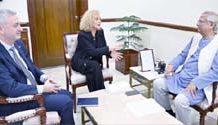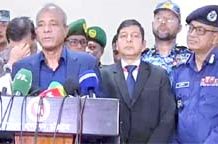C T Online Desk: An increased cost of living will be straining households nearly across the board as the government has already increased energy prices for securing $4.5 billion in loans from the International Monetary Fund.
The government expects to receive the first tranche of the loan in the next month.
According to the finance division officials, increasing the energy price is one of the major conditions of the IMF loan to be disbursed in seven installments over a period of three years for helping the government to overcome the severe dollar shortage.
The IMF has asked the government to reduce budgetary subsidy that has already crossed Tk 1 lakh crore from the initial projection of Tk 80,000 crore in the current national budget because of price hike of energy items in the global market due to war in Ukraine.
Economists, however, said that a majority of people were facing extra pressure to cope up with the growing living costs as the IMF recipe was for establishing the market-based economy.
Dhaka University economics department chairman professor Mahbubul Mokaddem Akash noted that the IMF was harsh too to the subsidy meant for general people.
‘The IMF suggestions for financial sector reform to check growing wilful loan defaulters are not implemented properly,’ he said.
The government has also made the Bangladesh Energy Regulatory Commission almost dysfunctional, paving the way for the Energy Division to exercise executive power to adjust the prices of energy items.
Allowing the BERC to exercise its usual practices to readjust the prices of energy items will have put the government in difficulties to fulfill the IMF conditions, observed the academic.
Since finance minister AHM Mustafa Kamal sought the loan from the IMF to tackle the shortage of foreign currencies, prices of fuel oil, power, gas and fertiliser increased on a number of occasions.
In August, the government increased the price of fuel oil by a record 50 per cent despite the fact that the Bangladesh Petroleum Corporation made a profit of over Tk 48,000 crore between 2014 and 2021 by selling fuel oil in the local market at higher than buying rates from the international market.
In a space of the past five days, the government enhanced prices of power and gas by executive order.
Under the previous IMF loan of around $1 billion, the government increased the price of fuel oil on five occasions while the price of power went up on eight occasions between 2012 and 2015.
IMF deputy managing director Antoinette M Sayeh who ended a five-day tour in the capital on Wednesday in connection with the current loan deal appreciated the government efforts to overcome difficulties arising from the war in Ukraine just after the Covid-19 pandemic.
In a statement on January 16, Antoinette said that the IMF executive board was expected to consider approving the loan programme with Bangladesh on January 30.
Both the sides have reached a preliminary agreement under the Extended Credit Facility, Extended Fund Facility, and the new IMF Resilience and Sustainability Facility.
The finance ministry officials expect that the first tranche of $447 million under the proposed loan programme would be disbursed in February.
The rest of the loan will be disbursed in six tranches in a gap of every six months over a period of next three years.
Policy Research Institute executive director Ahsan H Mansur said that the IMF should emphasise reforms to banking and tax sector with its loan programme.
The Bangladesh Bank has already committed to change lending rates and calculation of forex reserves.
Ahsan H Mansur, also a former IMF official, said that the government had no option but to reduce budgetary subsidy on energy because of shortage of tax incomes.
The government has already taken loans from the central bank to meet the budget deficit, however, it caused upward inflationary pressure, he noted.
Economists observed that due to the flawed monetary policy of the government, inflation was much higher than the official calculation of below 10 per cent.
Inflation will stay high in the coming months as the central bank still sticks to its lending rate of 9 per cent for industrial sector which is one of the flaws, they pointed out, adding that the Bangladesh Bank could not change the policy although the rate had risen globally over the past one year.
Former World Bank Dhaka office chief economist Zahid Hussain doubted that the IMF might not be hard on other necessary reforms the country needed to establish good governance in the banking sector.
There are many signs that the IMF deviated from its core issue of dealing with the balance of payment and other macroeconomic indicators over the years, he noted.
The global lender introduced climate change-related programme after it began poverty-related programme in early 2000s, the economist said, criticising the IMF that had transformed into an ordinary multilateral lender.











